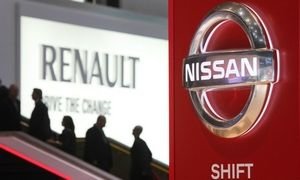Renault-Nissan Plan Cheap EV for China

Nissan sold just 1,273 units of the Venucia e30, a local version of the Leaf, in China last year, according to the China Association of Automobile Manufacturers (CAAM). The car starts at 242,800 yuan ($36,900).
Ghosn said he was unhappy with Venucia sales. "We envisaged much more than that. We know price is a handicap," he said.
"For me the solution will be a very cheap electric car," Ghosn told journalists at the opening of Renault’s plant here in central China on Monday.
Ghosn did not comment on possible sales in markets outside China such as Europe or the size of the car.
China's market for cars termed 'new energy vehicles' -- pure EVs and plug-in hybrids -- has rapidly expanded in the last few years to reach 379,000 in 2015, according to government figures quoted by the China Daily newspaper.
Renault EV
Renault will sell its electric Fluence EV in China from 2017 under a Chinese brand name, a condition imposed by the Chinese government foreign automakers in return for a license to build cars in the country. The Fluence EV will be assembled at Renault's Wuhan plan using kits imported from the company's plant in Korea.
Renault expects to sell just a few thousand Fluence EVs a year, the automaker's chief competitive officer, Thierry Bollore, said.
The car will be badged with an unused brand name from Dongfeng, Renault-Nissan's joint venture partner in China.
China's EV market has been driven by substantial subsidies from the government, which has said it wants five million new-energy vehicles on the road by 2020.
Ghosn said that despite the incentives, most sales were very cheap electric vehicles made by local brands costing between 30,000-50,000 yuan ($4,600-$7,000). The biggest selling electric car last year was the tiny Kandi EV city car with 16,736 sold, according to CAAM.
"The government is saying we want more electric cars. The public is saying 'yes, but we want them cheap'," Ghosn said.
He said Renault-Nissan would start development of an affordable electric car but the automakers first had to define what the public would accept. "We need to work out what are the best compromises between acceptable performance and lowest price possible," he said.
Hu Xindong, the joint head of the Dongfeng-Renault joint venture, described purchase of EVs in China as "passive," driven by incentives rather than choice.
He cited the example of China’s two biggest cities Shanghai and Beijing where residents obtain a license plate – essentially permission to own a car - free if they buy an electric vehicle.


